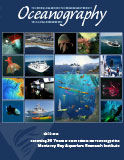Full Text
Among members of the ocean sciences research community, everyone recognizes the importance of the ocean, such as its role in the climate system and our economy. We understand that the ocean provides critical food and energy resources, routes for commerce, sites for recreation, and much more. And we know that beneath the seafloor, movement of descending tectonic plates causes some of the most devastating earthquakes and volcanoes. Yet much of the public knows few or none of these fundamental facts. This lack of basic scientific knowledge outside of academia about the earth plays no small role in the decline of funding for the ocean sciences over the past few decades. In the long run, our research programs will thrive only if the public understands and values the need for exploration, discovery, and study to better understand and care for our planet. This speaks to the importance of our role as educators beyond our traditional focus on research and graduate education, and our responsibility to develop creative programs that both educate undergraduates about ocean topics, and also provide tangible skills that they can use when pursing jobs.
At least in the United States, it was long thought that practicing oceanographers first needed an undergraduate degree in one of the so-called “basic” sciences—physics, chemistry, biology, or geology. Relatively few universities offered undergraduate courses in oceanography. In much of academia, oceanography remains a research-intensive, applied field. Those attitudes are changing. Many undergraduates who are not interested in becoming working oceanographers would be motivated to learn fundamental scientific concepts through ocean examples. The ocean is a great vehicle for teaching systems thinking—its study demands interdisciplinary connections and can make abstract scientific concepts tangible for many students.
I recently conducted a highly nonscientific survey about undergraduate oceanography programs and heard from some wonderfully dedicated educators who are engaging undergraduates through experiential learning. Here are a few examples from the responses I received.
Claudia Benitez-Nelson of the University of South Carolina School of Earth, Ocean and Environment reported on an exciting experimental program in a “living and learning” community, including an opportunity to live in a Green Quad Dorm. Their non-major classes are very popular, reaching thousands of students each semester. The community emphasizes laboratory and field experiences. Claudia noted that while “hands-on” classes are more expensive to run than lectures, they are worth the cost. The benefits of experiential learning transcend any topic or any facts, because these classes teach curiosity and creativity, and provide a toolkit for lifelong discovery and learning—exactly the kind of things needed for productive employment in any field.
The University of Washington School of Oceanography—my alma mater—has always had a strong experiential learning component to its undergraduate program. With ready accessibility to Puget Sound, the university’s enviable location offers a wealth of opportunities for hands-on discovery of ocean topics, and its program includes opportunities for students to work at sea. Tansy Clay Burns at the University of Washington wrote to me that, in addition to attracting ocean sciences majors with a BS degree, the school includes options for a BA and minors such as oceanography, climate, Arctic studies, and ocean technology attached to various other programs. The program is reaching out to fill a variety of needs, including attracting students who might want to learn more about the ocean while pursuing other career paths.
My own institution, Oregon State University, is starting an innovative program called the Marine Studies Initiative. Note the word “studies” rather than “science” in the name: the program is a collaboration between the College of Liberal Arts and the College of Earth, Ocean, and Atmospheric Sciences in a university-wide commitment to extend the reach of marine topics into areas of arts, literature, and elsewhere. This initiative also includes a residential component in which the students can spend a few terms living by the ocean and absorbing its rhythms. The goal is to engage students who might not think of themselves as oceanographers by using the ocean examples for addressing global problems, from climate change, to coastal pollution, to food from the sea. The State of Oregon has contributed funds to make sure students—including those from diverse backgrounds who might not have contemplated marine studies—can experience the ocean. Regardless of whether these students become oceanographers, they gain knowledge about the ocean and the earth that will be useful in their future careers and lives.
These programs in South Carolina, Washington, and Oregon are just a few examples of ongoing experiments in ocean education. Other institutions around the world also have excellent programs for undergraduates and for the public. Nevertheless, as a field we could do far more. Experiential learning is labor intensive and expensive, and it is difficult to scale hands-on programs to reach a large number of students. But overcoming these challenges is critical to our work and to the people it benefits. Our traditionally strong research programs are an asset that can be leveraged for experience-based education, and in turn an educated public will understand the long-term needs of fundamental discovery related to the ocean and many other fields—research that in the long run fuels economic vitality and international understanding.
The Oceanography Society would like to facilitate the sharing of information about undergraduate oceanography programs, including options for non-majors, so that we can all learn from each other’s successes and failures, develop best practices, and inspire new and innovative undergraduate classes and programs. A good place to get started thinking about this topic is through reading the nearly two decades of “The Oceanography Classroom” columns published in Oceanography that are written by experienced and creative undergraduate educators (see https://tos.org/classroom). If you would like to join a TOS committee on undergraduate education, let’s talk. Your ideas are welcome.
– Alan C. Mix, TOS President

